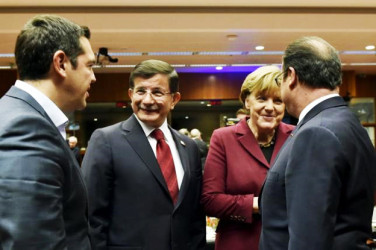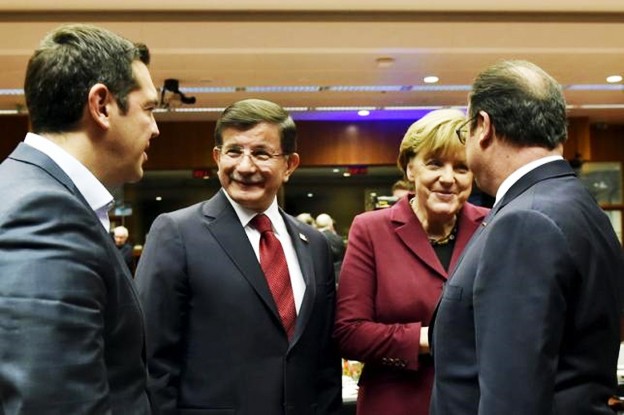BRUSSELS, (Reuters) – Turkey promised to help stem the flow of migrants to Europe in return for cash, visas and renewed talks on joining the EU in a deal struck yesterday that the Turkish prime minister called a “new beginning” for the uneasy neighbours.
Leaders of the European Union met Turkish premier Ahmet Davutoglu in Brussels yesterday to finalise an agreement hammered out by diplomats over the past month, as Europeans struggle to limit the strain on their 28-nation bloc from taking in hundreds of thousands of Syrian refugees.
A key element is 3 billion euros ($3.2 billion) in EU aid for the 2.2 million Syrians now in Turkey. The money is intended to raise their living standards and so persuade more of them to stay put rather than attempt perilous crossings to the EU via the Greek islands.
The final offer of “an initial” 3 billion euros represents a compromise between the EU, which offered that sum over two years, and Turkey, which wanted it every year. Now the money, as French President Francois Hollande said, will be paid out bit by bit as conditions are met, leaving the total payout unclear.

“As Turkey is making an effort to take in refugees — who will not come to Europe — it’s reasonable that Turkey receive help from Europe to accommodate those refugees,” Hollande told reporters. He added that the deal should also make it easier to check migrants arriving and keep out those who pose a threat, like Islamic State militants who struck Paris two weeks ago.
Also on offer to Ankara, which wants to revive relations with its European neighbours after years of coolness as it faces trouble in the Middle East and from Russia, is a “re-energised” negotiating process on Turkish membership of the EU, even if few expect it to join soon.
Many Turks could also benefit from visa-free travel to Europe’s Schengen zone within a year if Turkey meets conditions on tightening its borders in the east to Asian migrants and moves other benchmarks on reducing departures to Europe.
“Today is a historic day in our accession process to the EU,” Davutoglu told reporters on arrival. “I am grateful to all European leaders for this new beginning.”
DESPERATION
Aware of a sense of desperation in Europe for a solution to a crisis that has called into question its own cohesion and the future of its Schengen passport-free travel zone, Turkish President Tayyip Erdogan has driven a hard bargain.
The deal involves Turkish help, including through naval patrols and border checks, in handling the flow of migrants to the EU, expected to reach 1.5 million people this year alone.
“Results must be achieved in particular in stemming the influx of irregular migrants,” a joint statement read.
“Both sides will, as agreed and with immediate effect, step up their active cooperation on migrants who are not in need of international protection, preventing travel to Turkey and the EU … and swiftly returning migrants who are not in need of international protection to their countries of origin.”
Summit chairman Donald Tusk stressed that the meeting was primarily about migration rather than improving Turkish ties, which have been strained in recent years as Erdogan has used a powerful electoral mandate to consolidate his power. Critics say he has abused the rights of opponents, media and minority Kurds.

